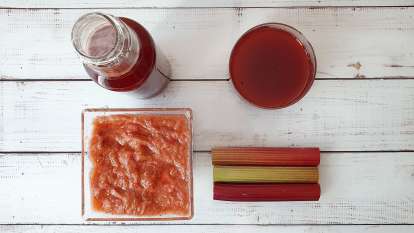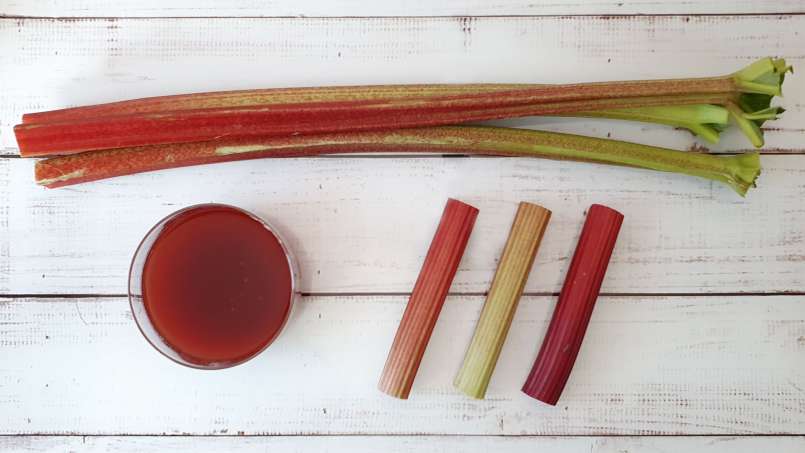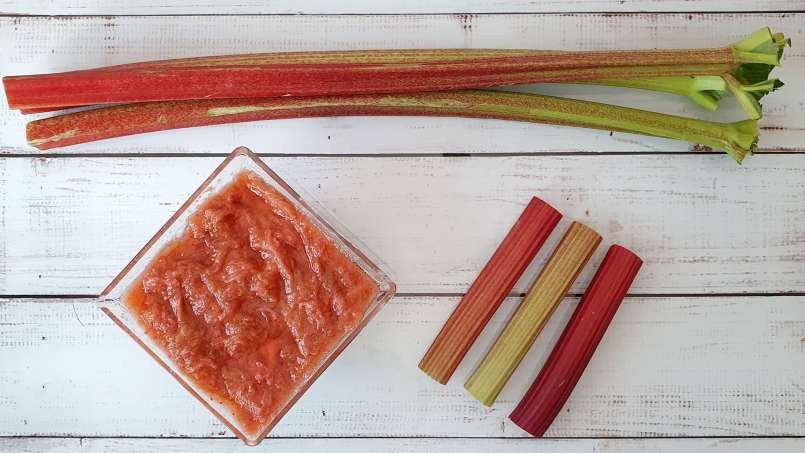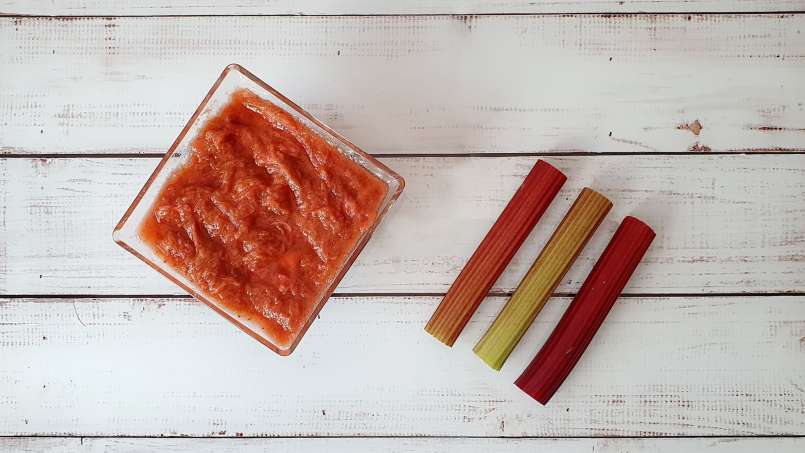Rhubarb syrup
Rhubarb syrup, obtained by boiling with sugar, in addition to the perfect taste and aroma, also has many therapeutic properties: detoxifying, tonic rich in minerals and vitamins such as potassium, phosphorus, magnesium, iron, zinc and vitamin C, digestive, diuretic, good for the treatment of anemia, anorexia and asthenia.
Servings: 25 servings
~ 1 liter of rhubarb syrup (~ 25 glasses of juice, for a glass using 40 ml of syrup)
Ingredients
Materials
- - a pot
- - a sieve for separating the syrup
- - glass containers
Preparation
 Remove the leaves from the rhubarb stem, as they are poisonous. Then clean the wood with a vegetable cleaner or simply try to peel them from one end, by pinching with the tip of a knife, then pull the wood fiber. After removing the peel/bark (woody part), the rhubarb sticks are washed well under running water.
Remove the leaves from the rhubarb stem, as they are poisonous. Then clean the wood with a vegetable cleaner or simply try to peel them from one end, by pinching with the tip of a knife, then pull the wood fiber. After removing the peel/bark (woody part), the rhubarb sticks are washed well under running water. Cut rhubarb stalks into slices of about 1-2 cm and add to the pan.
Cut rhubarb stalks into slices of about 1-2 cm and add to the pan. Add the water over the sliced rhubarb and let it boil until they become very soft, about 10-15 minutes.
Add the water over the sliced rhubarb and let it boil until they become very soft, about 10-15 minutes. At this point, add the strawberries and let them boil for about 5 more minutes, until the syrup turns a nice color, then turn off the heat.
At this point, add the strawberries and let them boil for about 5 more minutes, until the syrup turns a nice color, then turn off the heat. Leave to cool for about 5 minutes and then strain the syrup using a sieve.
Leave to cool for about 5 minutes and then strain the syrup using a sieve. We put the obtained liquid together with the sugar to boil, over medium heat, chewing occasionally until the sugar dissolves completely. Then reduce the heat to low and simmer for about 15 minutes, until slightly thickened.
We put the obtained liquid together with the sugar to boil, over medium heat, chewing occasionally until the sugar dissolves completely. Then reduce the heat to low and simmer for about 15 minutes, until slightly thickened.
To make sure the syrup is cooked enough, pour a teaspoon of syrup into a bowl and let it cool for 2-3 minutes. If it will tighten (bind), then the syrup is ready. Add the juice of a lemon over the syrup formed and leave it on the fire for another 5 minutes.
Add the juice of a lemon over the syrup formed and leave it on the fire for another 5 minutes. Turn off the heat and let the syrup to cool / quiet for about 5 minutes.
Turn off the heat and let the syrup to cool / quiet for about 5 minutes. Then put the syrup in glass containers (sterilized recommended) which will close tightly.
Then put the syrup in glass containers (sterilized recommended) which will close tightly.
Cover the containers with a towel or a thick blanket to cool more slowly (leave for about 12 hours). Thus the syrup will last, without altering, for as long as possible.
Store in a cool, dark place. Let's not forget the remaining pulp, we don't throw it away, we can prepare a delicious puree with bee honey ...
Let's not forget the remaining pulp, we don't throw it away, we can prepare a delicious puree with bee honey ...
Administration
For therapeutic purposes, however, we recommend rhubarb maceration with honey, but it can be kept only 3-4 days (cold).
It can also be used as a sweetener in various beverages.
Consume a large spoon (~ 40 ml) taken as such or in combination with various liquids when you feel the need, however it is not recommended to exceed 5 servings per day, as it can become a diuretic.
It is not recommended to consume it in the form of juice immediately after a meal.
The remaining pulp, mixed with honey is delicious.
Observations
Store in a cool, dark place or in the refrigerator.
Once a bottle of syrup is opened, it must be refrigerated and consumed within 30 days.
Effects and benefits
- detoxifier
- tonic
- rich in minerals and vitamins such as potassium, phosphorus, magnesium, iron, zinc and vitamin K and C
- digestive
- diuretic
- good for treating anemia, anorexia and asthenia
Side effects
- purgative if consumed in large quantities or very cold
FAQ 💡❓
What are the health benefits of rhubarb syrup?
➡️ Rhubarb syrup stimulates digestion, supports the liver, helps detoxify the body, and has a general tonic effect.
Is rhubarb syrup a natural laxative?
➡️ Yes, rhubarb contains active compounds with a mild laxative effect that can help regulate bowel movements.
How do you properly prepare rhubarb syrup at home?
➡️ Rhubarb stalks are washed, cut into pieces, and boiled with sugar and water to obtain a sweet-sour syrup with beneficial effects.
When and how should rhubarb syrup be taken?
➡️ It is recommended to take 2–3 tablespoons per day, preferably before meals, to support digestion and energy.
Can children use rhubarb syrup?
➡️ It is not recommended for children under 12, as it may cause digestive discomfort and is too strong for their system.
Is rhubarb toxic in some cases?
➡️ Yes, rhubarb leaves contain toxic oxalates and should not be consumed; only the stalks are used to make the syrup.
What side effects can rhubarb syrup have?
➡️ Excessive consumption may cause diarrhea, abdominal cramps, or electrolyte imbalances due to its laxative effect.
Who should avoid rhubarb syrup?
➡️ It is contraindicated for people with kidney disease, gout, kidney stones, or chronic diarrhea.
Does rhubarb syrup help with body detoxification?
➡️ Yes, it has depurative properties and supports toxin elimination by stimulating the liver and intestinal transit.
Can rhubarb syrup be used in weight-loss diets?
➡️ Yes, thanks to its digestive and detoxifying effects, it may support a weight-loss plan, but it should not be overused.
How should rhubarb syrup be stored properly?
➡️ It should be kept in tightly sealed glass bottles, in a cool, dark place, to preserve its properties as long as possible.
Can rhubarb syrup be used as a sweetener in other recipes?
➡️ Yes, it can be added to teas, lemonades, desserts, or other drinks, giving them a pleasant tangy taste and a healthy touch.




Comments